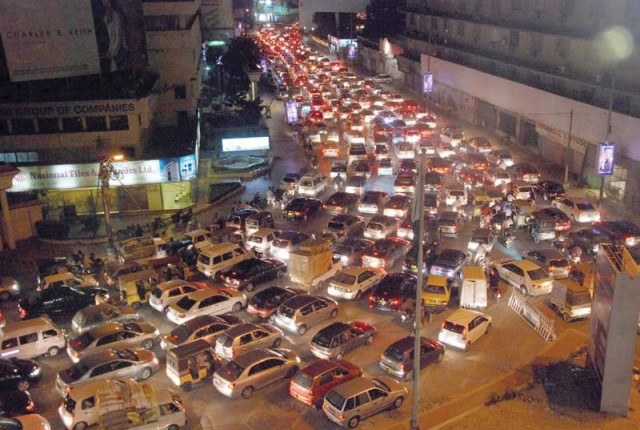The need for mass transit: Legislating a viable transport solution for Karachi
Speakers share guidelines to develop a sustainable urban transport policy

Karachi’s citizens get stuck in a traffic jam after every three kilometres on average. The one viable solution for the city is a mass transit system. PHOTO: FILE
Instead, he suggested building parking plazas, where people can park their cars and continue the rest of their journey via public transport. He was speaking at a consultative workshop on the legislative perspective of the Urban Transport Policy, jointly organised by the Pakistan Sustainable Transport Project (Pakstran) and the Compressed Natural Gas (CNG) Station Owners’ Association of Pakistan. The professor highlighted ways to attract commuters to use public transport, instead of private cars to reduce the volume of traffic on Karachi's roads. According to Ali, citizens of Karachi are stuck in traffic jams after every three kilometres. "A mass transit system is the only sustainable solution to address Karachi's transport woes," he said.

Sharing an overview of the principal guidelines of the urban transport policy drafted with the assistance of Pakstran, he said there was a dire need for an operational urban transport system in Sindh. "We need to develop a sustainable transport policy and draft the rules and regulations for implementing such a policy in the province," he clarified.
Speaking on the population explosion in Sindh, Prof Ali said that in 2011, around 50 per cent of Karachi's total population lived in the outskirts of the city. He estimated that by now, it must have reached 48 per cent. According to him, these urbanisation and migration trends in Sindh clearly indicated that there was inadequate communication network between the rural and urban areas. "When 52 per cent of the population lives in the city and 48 per cent in the rural outskirts, there must be a proper road network to connect the two segments of population."
For Prof Ali, investment in developing and improving transport infrastructure must be prioritised, including wide-scale improvements in pedestrian facilities. "The public transport should be given priority on every signal to pass though first."
He was certain that commuters will willingly shift to public transport from their private vehicles, which according to him will naturally reduce the burden of vehicles from the roads.
Speaking on the CNG-related issues, the chairperson of the CNG Station Owners' Association of Pakistan, Malik Khuda Baksh, said that according to international environment reports, there has been a 62 per cent decrease in environmental pollution with the use of CNG in vehicles. "The CNG industry, which was at its peak in 2000, is now being forcefully pushed back by the government of Sindh," he alleged. "15 years ago, you could not stand at Bandar Road or Saddar due to vehicular pollution, due to the use of diesel," he recalled.
According to him, when the Oil Gas and Regulatory Authority was formed in 2002, it borrowed regulations from foreign countries, drafted its rules and then passed an ordinance based on those rules.
"The age of a car CNG cylinder is five years, according to those rules," he said. "After continuous filling of gas in the cylinder, oil components start accumulating inside. If those components rise above 1.5 inches, the cylinder becomes very dangerous." He claimed that in Karachi, there were cylinders that had not been tested since 1999. "They are no less than moving bombs."
He added that buses had started installing cylinders below the seats. "In case of leakage, the gas starts accumulating below the seat, as it does not find an escape and then the cylinder explodes," he said.
Published in The Express Tribune, June 19th, 2015.












1724319076-0/Untitled-design-(5)1724319076-0-208x130.webp)






COMMENTS
Comments are moderated and generally will be posted if they are on-topic and not abusive.
For more information, please see our Comments FAQ